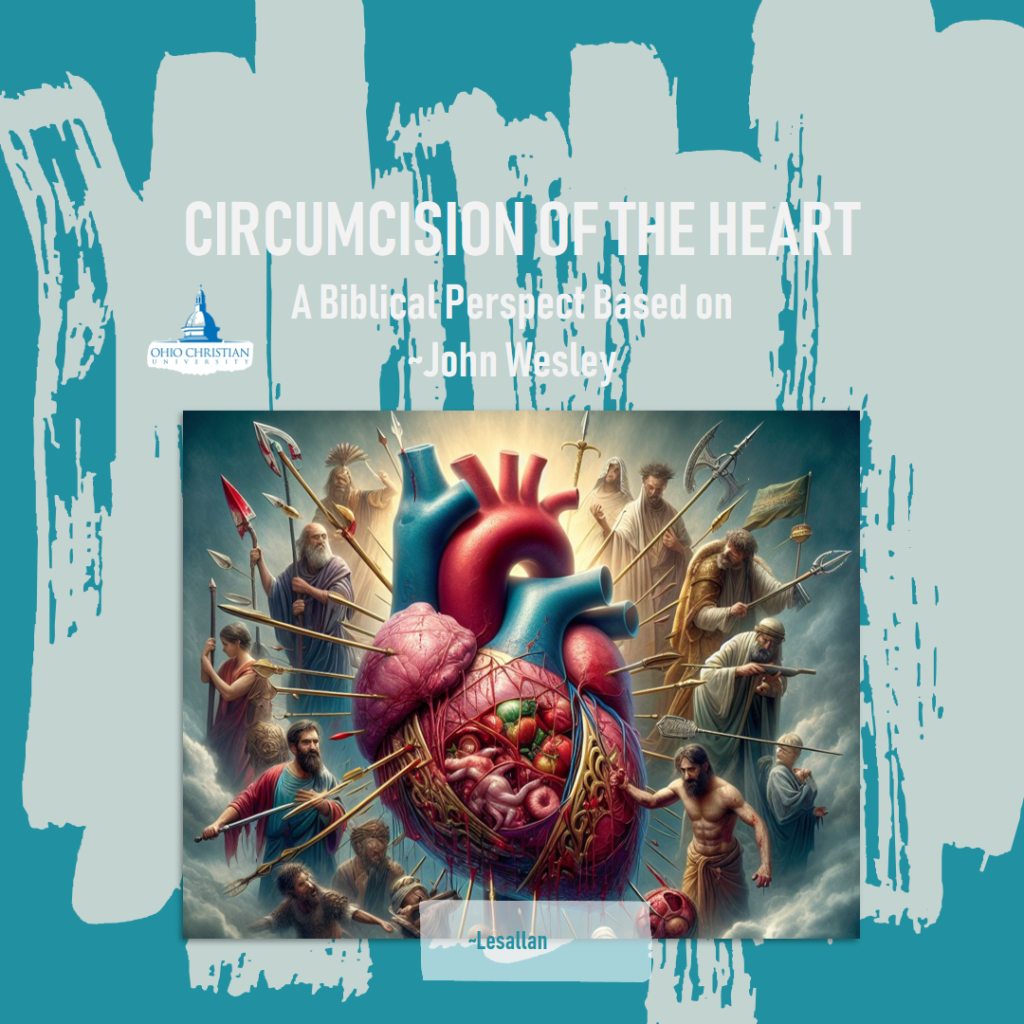
Summary of John Wesley’s Sermon – Circumcision of the Heart
Lesallan Bostron
Ohio Christian University
THE3360 Theology of John Wesley (ONLSP24)
Dr. Steven Gerig
January 14, 2024
Summary of John Wesley’s Sermon – Circumcision of the Heart
John Wesley, the esteemed founder of Methodism, delivered a powerful sermon called “Circumcision of the Heart,” based on Romans 2:28-29 (KJV). In this sermon, he eloquently argued that true devotion to God is not demonstrated through outward rituals like circumcision, but through the Holy Spirit’s inner transformation of the heart. Wesley drew upon various scriptural foundations to support his point, including Deuteronomy 10:16, 30:6, Jeremiah 4:4, and Colossians 2:11 (KJV). He also employed reason and personal experience to demonstrate that God expects more than mere external adherence to his laws and will ultimately judge individuals based on the condition of their hearts. This essay will concisely summarize Wesley’s sermon and explore his key arguments.
According to Wesley, circumcision of the heart means “a right state of soul, a mind and spirit renewed after the image of Him that created it” (The Wesley Center Online, 1993). He says through the use of Scripture that this involves “loving God with all our heart, soul, mind, and strength and loving our neighbor as ourselves” (Luke 10:27, KJV). He also says that this involves having a pure intention of doing everything for the glory of God and having a single eye to his will in all things. He claims that this is a necessary condition for salvation and sanctification and that without it, no one can enter the kingdom of God.
Wesley skillfully defends his argument by demonstrating its alignment with the nature and attributes of God. He posits that God, being a Spirit, values the inner being of individuals over their outward appearance. Furthermore, Wesley asserts that God’s holiness, justice, and goodness necessitate these qualities in his creations. He contends that these virtues cannot be attained through the flesh but through the heart only. Wesley supports his argument by giving examples of inwardly corrupt and outwardly religious individuals, such as hypocrites, Pharisees, and formalists. He also provides examples of outwardly sinful people who possess inner righteousness, such as publicans, harlots, and prodigals.
Wesley utilizes his expertise to strengthen his argument by providing evidence through observation and testimony. He contends that upon introspection, individuals will acknowledge their transgressions against God in their thoughts, words, and actions. Furthermore, Wesley notes that considerable evil and suffering exist among individuals who claim to follow a religious path, as observed worldwide. He cites Israel’s past as a demonstration of how God punished them for their spiritual impurity despite their physical circumcision. Similarly, he highlights Christianity’s history as evidence of how God rewarded those with spiritual purity, regardless of their physical circumcision.
Wesley employs scriptural evidence to bolster his argument, citing it as the ultimate authority and guide for belief and conduct. He asserts that the scriptures are unambiguous and consistent on this matter and do not conflict with reason or experience. He cites numerous passages from both the Old and New Testaments that illustrate God’s desire for truth in the deepest parts of the human heart and his intention to judge individuals based on their hearts. Wesley also cites several passages that offer grace and mercy to those with pure hearts while warning of punishment and condemnation for those with impure hearts.
To sum up, the sermon on circumcision of the heart given by Wesley is a compelling interpretation of the gospel. It emphasizes that God demands more than just adhering to his law externally; an inner transformation from the Holy Spirit is necessary. This transformation involves wholeheartedly loving God and our fellow beings while striving to fulfill his purpose and wishes. Wesley also stresses that this transformation is essential for both salvation and sanctification, without which one cannot enter the kingdom of God.
References:
The Wesley Center Online. (1993). The Wesley Center Online: Sermon 17 – The Circumcision Of The Heart. Wesley.nnu.edu. http://wesley.nnu.edu/john-wesley/the-sermons-of-john-wesley-1872-edition/sermon-17-the-circumcision-of-the-heart/


